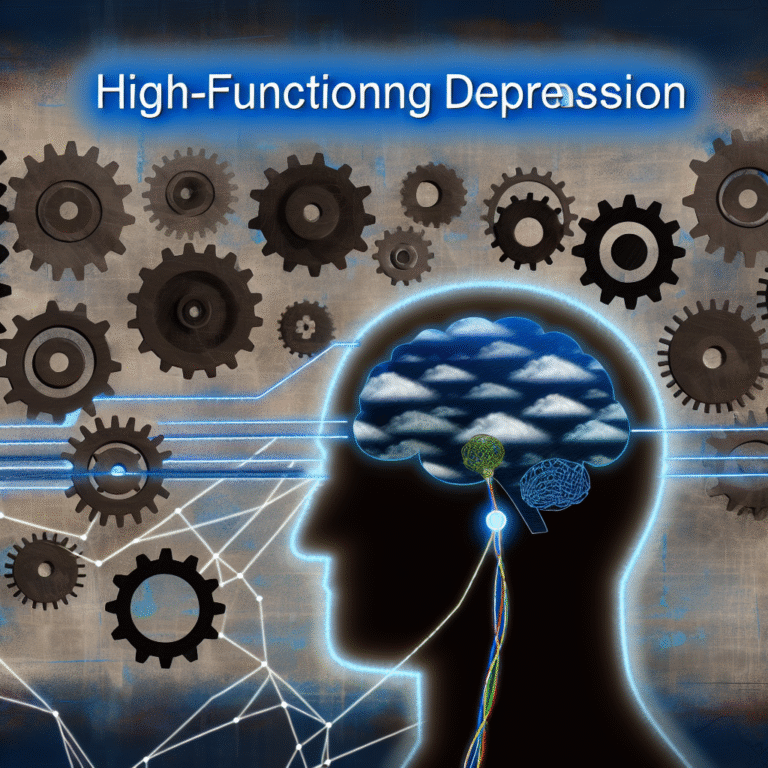
Navigating Life with Anxiety: Essential Tips for Staying Grounded
Introduction
Anxiety—it’s a word that captures a multitude of emotions, fears, and experiences. For many, it can feel like an insurmountable barrier to living a full and joyful life. In fact, according to the Anxiety and Depression Association of America, anxiety disorders affect over 40 million adults in the U.S. alone, which translates to a staggering 18.1% of the population. In today’s fast-paced world, learning how to cope and thrive despite anxiety is not just beneficial; it’s essential.
This comprehensive guide focuses on navigating life with anxiety: tips for staying grounded amid overwhelming feelings and intrusive thoughts. Discover practical strategies and insights that can help empower you to regain control, pursue your passions, and foster a sense of peace in your daily life.
Understanding Anxiety: The Foundation for Healing
Before diving into specific strategies, it’s crucial to understand what anxiety is and how it manifests. Anxiety isn’t just about feeling worried; it can trigger physical symptoms like rapid heart rate, sweating, and even dizziness. Recognizing these symptoms is the first step in navigating life with anxiety: tips for staying grounded.
What Causes Anxiety?
While the exact cause of anxiety can vary from person to person, a combination of genetics, brain chemistry, and environmental factors often plays a significant role. Stressful life events, trauma, and chronic health issues can exacerbate feelings of anxiety, making daily life a challenge.
The Benefits of Grounding Techniques
Grounding techniques provide a framework for connecting with the present moment, helping to alleviate the overwhelming nature of anxiety. Grounding is about anchoring yourself in the "here and now," allowing you to step back from anxiety-inducing thoughts.
Tips for Staying Grounded
Now that we understand the nature of anxiety and its effects, let’s explore practical tips specifically focused on navigating life with anxiety: tips for staying grounded.
1. Establish a Daily Routine
Creating a consistent daily routine can lend a sense of normalcy and predictability to your life. When fear feels unmanageable, structure can provide relief. Here are essential elements to include:
- Morning Rituals: Start your day with mindfulness or gentle movement exercises, such as yoga or stretching.
- Scheduled Breaks: Integrate regular breaks into your work or study schedule to reduce overwhelm.
- Wind-Down Routine: Establish calming activities before bed like reading or listening to soft music.
Case Study: Sarah’s Transformation
Sarah, a marketing executive, found herself overwhelmed by anxiety during high-pressure campaigns. By establishing a structured daily routine that included morning yoga, scheduled breaks for deep breathing, and limiting screen time before bed, she reported a significant reduction in her anxiety levels.
2. Practice Mindfulness and Meditation
Mindfulness and mediation are powerful tools for navigating life with anxiety: tips for staying grounded. By training your mind to focus on the present, you can reduce worrying about past or future events.
Tips to Get Started:
- Guided Meditations: Use apps like Headspace or Calm for guided sessions.
- Breathing Exercises: Try the 4-7-8 technique—inhale for 4 seconds, hold for 7, and exhale for 8.
Case Study: Mark’s Journey with Mindfulness
Mark struggled with chronic anxiety and found traditional therapy insufficient. After incorporating daily mindfulness and deep-breathing exercises, he discovered a newfound ability to remain calm during stressful situations.
3. Utilize Journaling as a Release Tool
Journaling allows you to articulate your feelings, process your anxiety, and track progress over time.
Journaling Tips:
- Gratitude Journaling: Write down three things daily that you are thankful for.
- Stream of Consciousness Writing: Set a timer and write without stopping, letting your thoughts flow freely.
Case Study: Lisa’s Reflective Journey
Lisa began journaling to cope with overwhelming emotions. Over time, she found that putting her thoughts on paper calmed her anxiety, helping her articulate her fears and reflect on her personal growth.
4. Engage in Physical Activity
Exercise is scientifically proven to reduce anxiety. When we engage in physical activity, our bodies release endorphins, which are natural mood lifters.
Suggestions:
- Daily Walks: Aim for at least 30 minutes of moderate walking.
- Group Activities: Join a local dance class or team sport for social connection.
Case Study: John’s Fitness Evolution
John, an introverted software developer, found solace in joining a local running club. Regular exercise not only helped him stay grounded but also significantly improved his social interactions.
5. Seek Professional Help When Necessary
While self-help techniques are invaluable, there are times when professional guidance is essential. A therapist can help you uncover underlying issues and develop coping strategies tailored to your needs.
- Types of Therapy: Cognitive Behavioral Therapy (CBT) focuses on changing negative thought patterns.
- Medication: Sometimes, medication can be a helpful adjunct to therapy.
Case Study: Rachel’s Therapy Experience
Rachel’s persistent anxiety led her to seek therapy. With the help of a skilled therapist, she learned to identify triggers and develop coping mechanisms, empowering her to navigate anxiety effectively.
6. Limit Exposure to Stressors
In our interconnected lives, social media, news, and even certain relationships can amplify feelings of anxiety. Learning to set boundaries is vital for mental well-being.
Active Steps to Take:
- Digital Detox: Set specific times to check emails and social media; otherwise, refrain.
- Curate Your Circle: Surround yourself with supportive individuals who uplift rather than drain you.
Case Study: Emma’s Social Media Shift
After recognizing that social media triggers her anxiety, Emma decided to limit her usage and unfollow accounts that made her feel inadequate. This simple change had a drastic impact on her mental health.
7. Nutrition and Sleep Hygiene
The connection between diet, sleep, and mental health is profound. Eating a balanced diet and ensuring adequate rest are crucial for maintaining emotional stability.
Nutrition Tips:
- Incorporate more whole foods into your diet, like fruits, vegetables, and whole grains.
- Stay hydrated; even mild dehydration can affect mood.
Sleep Tips:
- Create a calming bedtime routine.
- Aim for 7-9 hours of quality sleep per night.
Case Study: Mike’s Balanced Approach to Health
Mike, a busy college student, struggled with anxiety due to irregular eating and poor sleep habits. After re-evaluating his routine, he prioritized healthy meals and a strict sleep schedule, resulting in decreased anxiety levels and improved focus during studies.
8. Build a Support Network
One of the most effective ways to navigate life with anxiety: tips for staying grounded is by fostering relationships that support your mental health. Building a network can provide you with encouragement, understanding, and a sense of belonging.
How to Build Your Network:
- Join local support groups or online forums.
- Connect with friends and family who understand your experiences.
Case Study: David’s Community Connection
David faced severe anxiety and initially felt isolated. By joining a local support group, he discovered shared experiences and found comfort in talking with others navigating similar challenges.
Conclusion
Navigating life with anxiety can often feel like an uphill battle, but it doesn’t have to be. By implementing these tips for staying grounded, you can take meaningful steps to reclaim control over your life. Remember, anxiety is just one part of who you are; it doesn’t define you. Engage in practices that cultivate strength, seek support when necessary, and celebrate every small victory on your journey.
Each day is an opportunity to learn, grow, and adapt so that you can stride confidently toward a balanced and fulfilling life. If you feel anxious today, remember: you are not alone, and tools are available to help you thrive.
FAQs: Navigating Life with Anxiety
1. What are common symptoms of anxiety?
Common symptoms include nervousness, rapid heartbeat, excessive worry, fatigue, and difficulty concentrating. Physical symptoms may also appear, such as sweating and insomnia.
2. How can I identify my triggers?
Keeping a journal can help identify specific situations or interactions that increase your anxiety levels. Documenting your feelings can also reveal patterns over time.
3. Is it normal to feel anxious sometimes?
Yes, it’s entirely normal to feel anxious at times, especially during significant life changes or stressful events. However, if anxiety interferes with daily life, it may be beneficial to seek help.
4. Can anxiety be treated without medication?
Yes, many individuals successfully manage their anxiety through therapy, lifestyle changes, and support networks. It’s essential to find the right approach that works for you.
5. How can I help a friend who is experiencing anxiety?
Listen without judgment, offer your support, and encourage professional help if necessary. Educating yourself about anxiety can also help you provide better support.
By employing these methods and recognizing the importance of caring for your mental health, you can skillfully navigate life with anxiety: tips for staying grounded with grace and resilience. Remember, it’s okay to seek help, celebrate your progress, and invest in your well-being every step of the way.

















